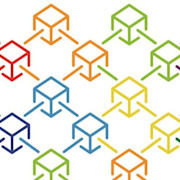- Science News
- Featured news
- Christopher Clack and Olinga Ta’eed launch Frontiers in Blockchain: facilitating discoveries which could “revolutionize the world”
Christopher Clack and Olinga Ta’eed launch Frontiers in Blockchain: facilitating discoveries which could “revolutionize the world”

— by Ruth Miller and Sarah Yardley
Frontiers in Blockchain aims to facilitate a movement of blockchain research knowledge and experience between academia, industry and the wider world. This new open-access journal is launched in collaboration with the Centre for Citizenship, Enterprise and Governance (CCEG) Think Tank and led by Olinga Ta’eed, Director, CCEG, and Christopher Clack, financial computing expert and founder of the Thomson Reuters laboratory, University College London.
Why is it important to launch a journal on blockchain?
Blockchain is currently a hotly debated phenomenon, infiltrating the media with stories such as the Bitcoin frenzy, upheaval of business structures and the promises and cautions of a “disruptive” technology. A large community of blockchain pioneers is developing this new technology, exploring the consequences of integrating blockchain with legacy technology and the real world, and imagining new possibilities for communities sharing data.
As a multidisciplinary open-access journal, Frontiers in Blockchain facilitates future developments by disseminating and communicating the latest scientific knowledge and impactful discoveries — both theoretical and applied — to researchers, academics, practitioners and the public worldwide.
So, what exactly is blockchain?
Blockchain comprises a network of replicated data organized into a time-ordered chain of “blocks”, each immutable, verifiable and public. When a new update is made, the update and the parties involved in the update may be verified by reference to the “chain” of previous records, and their agreement incorporated with other recent updates to create a new block — which is then added to the current chain. The global network is accessible to any computer logged into it, and, as a new block is made, the entire network is updated in real time — decentralizing the data improves accessibility and resilience, and cryptographic methods ensure the chain is almost impossible to corrupt.
Frontiers in Blockchain launches with six sections
Although financial transactions were a major driving force in the initial development of this technology, Frontiers in Blockchain launches with 6 sections, demonstrating the increasing diversity within the field. Each is led by experts from across the globe, tackling the biggest debates within the sector.
Blockchain Technologies (led by George Giaglis, University of Nicosia, and Philipp Sandner, Frankfurt Blockchain Centre) investigates the systems and code maintaining the validity and security of the blockchain network, with Smart Contracts (Thomas Butler, University of Cork, and Maria Vigliotti, Sandbrooks Consulting) examining autonomous code running on blockchains and how this code is derived from legal agreements.
Cryptocurrencies and the frameworks they operate in are explored in Financial Blockchain (Pinar Emirdag, University College London, and Garrick Hileman, London School of Economics), while Non-Financial Blockchain (Claudio Tessone, Universität Zürich, and Massimo Bartoletti, Università di Cagliari) considers the movement of intangible assets, such as votes or intellectual property rights, and the guarantee of their provenance.
The possibilities, impacts and governance of blockchain are debated in Fourth Industrial Revolution (led by Carsten Maple, University of Warwick, and Paolo Tasca, University College London).
Blockchain for Good (Jane Thomason, University of Queensland, Glenn Parry, University of the West of England, and Richard Adams, Cranfield University) discusses its potential for innovation with a moral, ethical and responsible purpose, and explores its political, philosophical, environmental and social implications.

Why is the launch of Frontiers in Blockchain so timely?
Field Chief Editor Christopher Clack (University College London), stresses the timeliness of Frontiers in Blockchain: “There’s a huge amount of work going on in industry, as well as in academia, and bringing the two together is really important.
“A good example of that would be looking at Smart Contracts, which might involve research by computer scientists, cryptographers, linguists, and lawyers looking at legal semantics.”

(Director of the CCEG), fellow Field Chief Editor of this groundbreaking new journal, sees blockchain not just as a disruption, but as a solution — applicable to problems of economy, ecology, society and ultimately humanity.
Frontiers in Blockchain welcomes high-quality article submissions and Research Topic proposals on themes across the blockchain discipline, to promote the formation and dissipation of knowledge in this emergent and rapidly advancing area.
Follow Frontiers in Blockchain at @FrontBlockchain to get the latest research and updates, or contact us directly at blockchain@frontiersin.org








